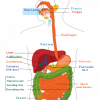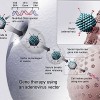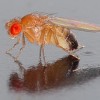Posts tagged genetic disease

Guts against Diabetes
Mar 21st
For a very long time I have been using Diabetes as an example of a disorder that is caused by a mutation in the insulin gene. This mutation would stop the cells from making insulin, and a diabetic might need daily insulin injections to regulate their sugar levels properly. I don’t know what took me so long to realize that this was completely wrong. That while some diabetics are insulin dependent, it is because their insulin-producing cells of the pancreas are being completely destroyed by the immune system. And while they still aren’t sure about why these cells are being More >

Evolution – Got Milk?
Feb 17th
After asking students during a lesson on mutations if it is possible that a mutation in DNA could be good, most students will nod yes without much understanding. Recently, I finally had one student raise his hand immediately and answer the question (with extreme surprise that no other students were blurting out the answer)…”evolution!” He was able to make the connection between changes in DNA that are building up over time, and how that change can possibly make that organism better in some way. If it helps the survival of an organism, that mutation is going to stick around and More >

Merry Christmas to Hemophilia Patients
Dec 15th
Gene therapy is a technique that offers the potential to replace defective copies of genes in any genetic disease with an intact version. While the idea of this treatment sounds alluring, the actual practice of it is a whole other story. There are a few drawbacks to this technique that must be considered, including the potential risk of an immune response because the gene is inserted with the use of a virus, which the immune system will see as foreign. Also, most patients so far have needed multiple treatments over the course of their lifetime, estimating to cost much more More >

Model Organisms
Oct 12th
I asked a group of 5th graders the other day whether or not we can learn anything from studying other living things. For example, if we mutate or change the DNA of another organism, like fruit flies (D. melanogaster), can we learn anything about what can happen when human DNA changes? For this particular class, it seemed to be an absolutely absurd question. This could have been because the thought of fruit flies made them ill right before lunch, or they were unsure about how much we have in common with fruit flies.
So we got into a discussion about model More >

Made to Order
Sep 12th
Preimplantation genetic diagnosis (PGD) is a technique that allows scientists to screen embryos after fertilization through In Vitro Fertilization (IVF), to prevent the transmission of serious genetic diseases for couples who are at risk. It also can be used to screen the egg and sperm before fertilization occurs. Only unaffected embryos will be transferred to the uterus for implantation.
Image from Nature Reviews Genetics 3, 941-955 (December 2002)
While this technology offers the hope to increase the success of IVF, it does raise some concerns about choosing a child in order to meet the needs and desires of parents. While most cases seem to have More >

DNA DAY 2010: What, me worry about my DNA?
Apr 29th
Of course, everyone asks me what I think about National DNA Day, to which I usually reply, “Every day is DNA Day at the DNA Learning Center.”
DNA is business as usual for me and legions of genetic researchers and counselors, but its also becoming business as usual for a lot of average people who are interested in their health or genealogy.
People also often ask me how I feel about all the personal DNA data that is becoming available. To which I usually reply, “I’d be a lot more concerned about losing a credit card or my social security More >

Eliminating Undesirable Traits
Feb 18th
Eugenics aimed to eliminate undesirable traits. But how do you define “undesirable”? There is anecdotal evidence that the incidence of some disorders has decreased due to genetic testing (see “Testing Curbs Some Genetic Diseases,” by Marilyn Marchione). In and of itself, this is a good thing, but is this eugenics? It would be hard to argue that most genetic diseases are undesirable; but some of the steps taken to eliminate disease — abortion, embryo screening — are controversial.
In contrast, there was a an effort to prevent hereditary blindness within the eugenics movement. Its proponents collected pedigrees, drafted legislation to prevent More >
